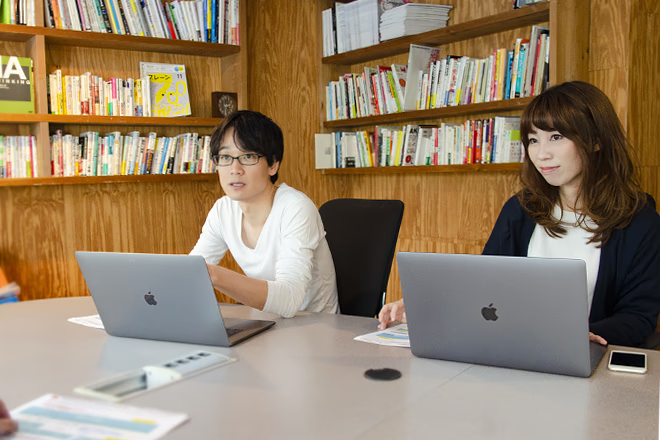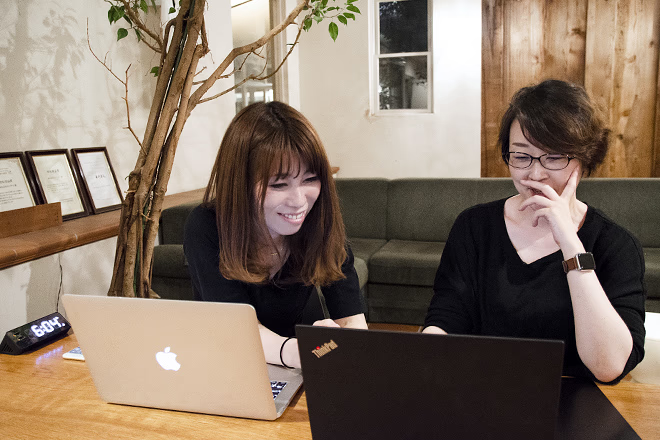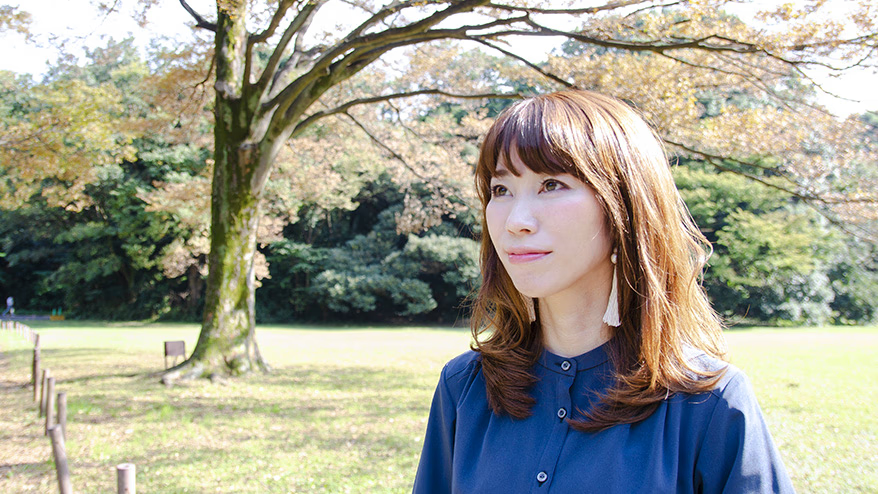I'm Ono, a designer.
I retired as the head of the design department in March, but I often have the opportunity to work with designer Reiko Takita through common projects. The story of how she joined Monosus is explained in this article, so I will skip that and instead, I would like to introduce her work stance and good points from my perspective.
Is she what they call a "designer"?
To be honest, I, who was her boss for four years, don't really understand her position as a designer. She doesn't have many obvious achievements, like coming up with design concepts that everyone is enthralled with, or winning design competitions one after the other (I agree).
However, he is involved in various projects, and when I notice it, I think "I'm really grateful for that," and when there is little work in the design department, he somehow makes a little money. He doesn't do anything particularly outstanding, but sometimes he shines brightly. That's the kind of designer he is.
When she first joined the company, she was hired as a designer in charge of a certain operational project, so operations were the main focus of her career. There may have been many similar jobs after that. Why did she tend to ask Takita to do operational-like projects? That's because those kinds of projects come with communication, overall business management, labor-hour management, and design checks. The reason she asked her to do those things was because she felt that "I can trust Takita."
Considering this, perhaps we should introduce her in a broader sense than just as a "designer."
Finding "what's important right now"
I have recommended her as MVP of the month in the past. As you can see from this article, she was not awarded for her "designer"-like qualities. The award was evaluated for her ability to grasp the entire project and for managing the work and progress of the seven designers involved. She checked a huge amount of work, communicated with the other party, and delivered it properly. You might think that this is a given for a capable director, but it is still amazing for a designer to do this. I think that this kind of thing, apart from effort, clearly separates people who are suited to it from those who are not.
Her main job now is the design and operation of a crowdsourcing website. She designs web pages and banners according to a schedule for campaigns and the like. Here too, her personality is on display, steadily completing her daily tasks, though unobtrusively. I am involved in renovating the UI/UX of the service, and she attends meetings with me once a week. As expected, she already has a good grasp of the service, and has become able to speak about UI/UX at the meetings as if it were her own business. The service itself is somewhat geared towards women, which is one reason we were matched, but the way she works diligently, working together with customers and Monosus's resident staff, is truly reliable.

What can be said from both projects is that she has a keen intuition for recognizing the key points from the overall picture of the job and finding the role she should play at that time. Since she has been involved in large-scale production operations up until now, I think her strength is her ability to grasp the important points while considering the context of each job.
Ability to put in the effort and immerse yourself
I'll give her a little praise as a designer. We needed illustrations for a certain project. I decided the tone of the illustrations, and I had been drawing them up until then. However, I couldn't speed up the operation if I kept drawing them, so I asked her to draw them.
During that time, I was busy and often away from the office. To be honest, I was a bit worried, but she finished it and asked me to check it. As a result, I had to handwrite the corrections, but to the untrained eye, the quality was not that different from what I had done.
What I want to praise here is not that she is "dexterous," but that during this time, she didn't make a single negative comment or bombard me with questions like "How do I do it?"
She must have looked carefully at the data of illustrations I had made in the past, thought about it carefully, and drawn it similarly. I was busy at the time, so she may have been concerned about not putting too much strain on me. Normally, I would be anxious and ask her a lot of questions, but once she decided to do it herself, she was immersed in it and worked hard. She didn't hesitate to go to the trouble of returning it.
It was really helpful and I was really happy at that time.
As a senior designer, I can't help but want to support her as she tries and fails. The time she spends thinking and acting for herself, rather than simply asking others for advice, will help her grow even more.
Once you decide, act immediately.
As you can see from the above, once she decides on something, she really shows off her skills.
The same is true when she becomes an employee.
At Monosus, whether you can become an employee is decided by an interview with the president, but it is very difficult to understand what the passing grade is. The president, Hayashi, doesn't like things like "contributing to the company," and he doesn't ask in depth questions like "What do you want to do to earn money?" He says that my project is important, but not everyone has a project that they can call their own. That's why there are many people who have been rejected many times in employee interviews in the past.
I think she passed the interview on the first try with just the determination, "I've decided to become a full-time employee." It may have been because she had been working part-time and had a long contract period up until then, but I think it was her determination that was so strong. At least I was scared, and I can understand why Hayashi had already decided to pass the interview when it started.
Come to think of it, it was the same when she was involved in the design and operation of the crowdsourcing site I mentioned earlier. After she was asked to help, she decided to do it and started showing up at the weekly UI/UX meetings extremely quickly. Although she is not a UI/UX specialist, I think she wanted to think about design from that perspective.
Once you decide, act immediately.
I think it's her manly personality, which embodies the motto, "First make a decision, then what can I do now?", that has helped her get to this point.
Paving your own path as a designer
Her title is designer.
However, in her case, the act of designing itself seems to be a good way of output.
Work is made up of many elements, and there are many things that you are not suited to and many ties. Her previous work was more of a "surface" job where many things were intertwined, rather than a single job such as design. Therefore, although she may not be aware of it, she must have her own know-how, and in fact, she has a wide range of work options.

Takita (left) discussing the design with the director
I don't know what she will decide or what her working style will be, but I'm not too worried. I'm sure she has high common skills as a worker.
All that's left now is for him to fully utilize his innate ability to make decisions and take action, and become a designer who is true to himself. I've left my position as his direct superior, and we're now senior and junior, but I want to continue supporting him until one day we can build a relationship where we can exchange opinions on an equal footing through design, each from our own different perspectives.

